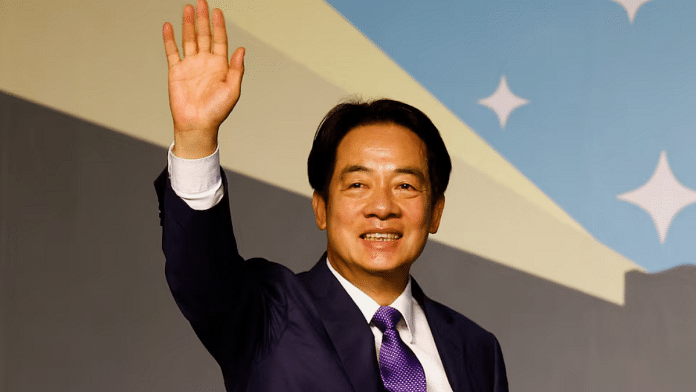Lai Ching-te, Taiwan’s President-elect, is regarded as polite, diligent, and committed to Taiwan’s interests by those who have worked closely with him. I had the same impression following a brief interaction with him at the Taiwan-Asia Exchange Foundation in March 2021.
For China, though, Lai is a “separatist” and “troublemaker”, just like Vice President-elect Hsiao Bi-khim, affectionately known as the ‘cat warrior’. Both Lai and Hsiao are banned from entering mainland China and Hong Kong.
In the 2024 presidential and legislative elections, which saw a voter turnout of 71.86 per cent, the 64-year-old Harvard-educated doctor and former mayor of Tainan secured victory for the Democratic Progressive Party (DPP), marking the party’s third consecutive term in power. With the incumbent Tsai Ing-wen bound by two-term limits, Lai is poised to assume office in May.
The implications of Lai’s election victory for Taiwanese perceptions of China are nuanced, encompassing both affirmative and negative dimensions. The significant support he garnered, with 40.5 per cent of voters backing him, signals a growing embrace of Taiwanese identity and the DPP’s advocacy for prioritising Taiwan’s interests and self-determination over the Kuomintang’s (KMT) emphasis on closer ties with China.
Although there are no overt signs of military hostilities within Taiwan, there persists a palpable apprehension regarding the perceived threat from China. Beijing’s evolving stance on the status quo and its establishment of a new norm in the Taiwan Strait are increasingly viewed with concern by both the Taiwanese government and the public.
Nonetheless, a majority still perceives maintaining the status quo as the most prudent course of action. The DPP’s unprecedented third consecutive term underscores a disconnect between the Taiwanese public and the KMT’s vision for Taiwan, and possibly reflects a perceived absence of viable alternatives to govern Taiwan effectively.
Lai, who labelled himself “a pragmatic worker for Taiwan independence” in a 2017 interview, has since moderated his stance to resonate more with public sentiment and align closely with President Tsai’s approach, especially after emerging as the frontrunner for the DPP presidential candidacy. It is worth noting that, particularly after assuming the chair of the DPP, Lai has consistently maintained that “Taiwan is already an independent and sovereign nation, thus negating the need for a formal declaration of independence”.
Lai expressed a commitment to maintaining the status quo and resuming cross-Strait dialogue following his victory. However, it is crucial to acknowledge that the trajectory of the cross-Strait relations cannot be solely determined by Lai’s intentions. China’s reluctance to resume dialogue, coupled with the DPP’s rejection of the 1992 consensus and any reference to the ‘one country, two systems’ framework, presents formidable obstacles.
On Weibo, there is significant discussion about Lai’s victory and his stance on the cross-Strait dialogue. One user emphasised that the DPP’s rejection of the 1992 consensus and insistence on Taiwan’s separate identity from China will not pave the way for constructive dialogue.
Victor Gao, vice president of the Beijing-based think tank Center for China and Globalization and chair professor at China’s Soochow University, adopted a more hawkish stance when he remarked that China needs to take heed of voices supporting Taiwan’s independence in light of Lai’s victory. He labelled those advocating for Taiwan’s independence as “indulging in fantasy”.
It is evident that any possibility of a future cross-Strait dialogue may come with stricter conditions from China’s side.
Also read: 2 sessions in Beijing show the country isn’t just evolving but fully turning into Xi’s China
Outlook for foreign policy
In his victory speech, Lai declared, “Taiwan will continue to walk side by side with democracies around the world.” There is a growing consensus that Taiwan needs to cultivate stronger ties with like-minded countries beyond just the United States and Europe while also prioritising the enhancement of its self-capabilities. Hsiao, who recently served as Taiwan’s representative to the US, lobbied for Taipei, contributing to the strengthening of ties with Washington. Her supporting role as vice-president for Lai indicates an effective approach toward achieving their foreign policy objectives. Additionally, there is a likelihood of the continuation of the New Southbound Policy with a focus on fostering relations with Asian countries.
There is no doubt that Lai’s victory was unanticipated and unwelcome in China. Just a day after Lai’s win, Nauru was poached by China, leaving Taiwan with only 13 diplomatic allies. Shrinking Taiwan’s diplomatic and international space has long been one of China’s most practised coercive strategies. Beijing is expected to intensify economic coercion, diplomatic poaching and intimidation through grey zone activities against Lai’s Taiwan.
While navigating cross-Strait relations poses significant challenges for Lai, maintaining consistency in other aspects of foreign policy promises a positive trajectory for both Taiwan and the Lai-Hsiao administration.
Sana Hashmi, PhD, is a fellow at the Taiwan-Asia Exchange Foundation and George HW Bush Foundation for US-China Relations. She tweets @sanahashmi1. Views are personal.
(Edited by Humra Laeeq)



